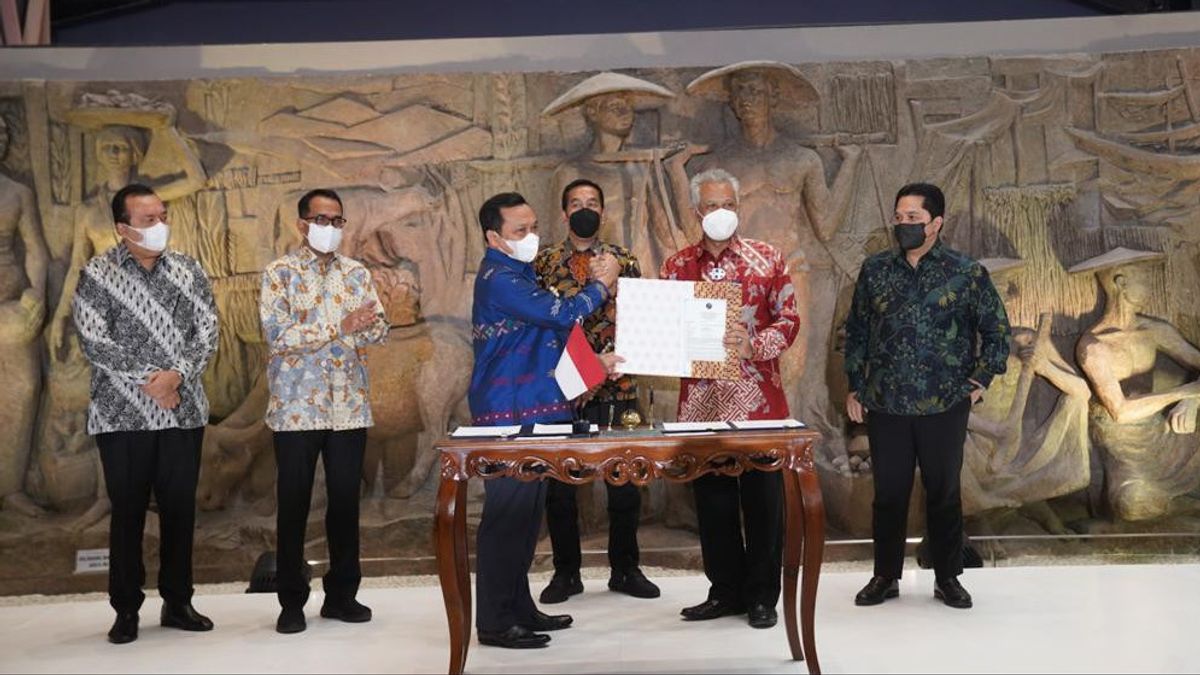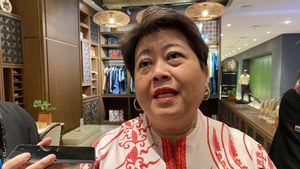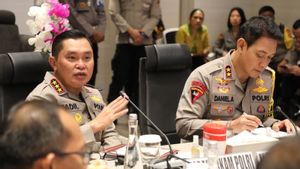JAKARTA - The management of Kualanamu International Airport, North Sumatra has officially moved to PT Angkasa Pura Aviasi (APA), a subsidiary of PT Angkasa Pura II who is also a consortium company with GMR Group from India. With this transfer of management, it is hoped that Kulanamu can improve Indonesia's trade relationship with India.
Minister of State-Owned Enterprises (BUMN) Erick Thohir said the management of Kualanamu Airport, North Sumatra by PT Angkasa Pura Aviasi (APA) was a concrete effort in improving the transportation ecosystem, not only human mobility but also supply chains.
"Alhamdulillah, today we together witnessed the handover of the management of Kualanamu Airport from PT Angkasa Pura II or AP II to APA, which is a joint joint joint venture with strategic partners, namely GMR Airports," Erick said while witnessing the signing of the commercial operational document for Kualanamu Airport by AP II and APA in Sarinah, Jakarta, Thursday, July 7.
This strategic partnership, said Erick, prioritizes a good corporate governance process through a transparent tender process, involving a review and assistance from BPKP. The goal is to provide benefits to Indonesia.
Erick hopes that this strategic partnership can improve the quality of Kualanamu Airport management to become more professional and improve services so that users feel comfortable, safe, and enjoyable.
"This is also an opportunity for Indonesia to build a new market. southern trade to the south has the potential. This collaboration allows us to have direct access between Indonesia and India," said Erick.
According to Erick, Indonesia's trade relationship with India is very good. GMR India, which works with AP II, will encourage higher traffic to Indonesia without having to stop in other countries.
"We need meat, India also needs coal from Indonesia. This is a mutually beneficial context. What previously stopped to neighboring countries, Singapore and Malaysia, now Sumatra is a hub before going back to other destination countries such as Korea or Australia," he explained.
Kulanamu Will become an International Hub
With this collaboration, said Erick, Kualanamu Airport will become an international hub to encourage North Sumatra as a tourism and cargo center. Erick does not want Indonesia to only be a market for other countries.
"This is a positive thing. Economic development is not only in Java. Economy in Sumatra is its own strength. The President has invested in toll roads. This is to improve the economy and employment in Sumatra," he said.
For Erick, Kualanamu Airport must also be able to compete with the dominance of Changi Airport in Singapore and Kuala Lumpur Airport in Malaysia by becoming the gateway to the international community to be able to recognize Indonesia through the doors of Sumatra.
In addition, Erick assessed that this collaboration also aims to reduce Indonesia's high logistics costs, which are currently 23 percent or higher than the world average of 13 percent.
"How can we compete if logistics prices are expensive. Pak Budi and I are serious about improving supply chains. The collaboration that we emphasize is how important North Sumatra is, we encourage it as a new center for Indonesia's economic growth in order to ensure that Indonesia's economic growth, which is targeted at five percent per year, will continue to grow until 2045, so that we become the fourth largest economic country in the world," said Erick.
The improvement in the quality of Kualanamu Airport also supports the strengthening of the tourism ecosystem, which has now returned to positive growth in line with Indonesia's success in overcoming the COVID-19 pandemic.
Erick also advised the management of Kualanamu Airport to maintain and preserve Indonesian culture. According to him, Kualanamu Airport can follow in the footsteps of Soekarno-Hatta Airport and I Gusti Ngurah Rai Airport which reactivates cultural parades as a permanent stage for Indonesian arts, culture and MSMEs.
"Korea can, then Indonesia must also be able. I again advise the ranks of the state-owned tourism sector who are present, continue our transformation program in developing and strengthening the Indonesian tourism ecosystem. Do business professionally and build strategic partnerships with professional partners," he said.
The English, Chinese, Japanese, Arabic, and French versions are automatically generated by the AI. So there may still be inaccuracies in translating, please always see Indonesian as our main language. (system supported by DigitalSiber.id)









